#i love queer people i love our history and community and i was us to grow and learn
Text
Everytime you attack a trannie for lovingly calling his friend a dyke, or a dyke for lovingly calling her friend a faggot, a 19 year old gay on twitter loses 10 more productive thoughts about intersectionality and solidarity to the void.
#i genuinely think the intracommunity slur discourse is a huge contributor to our deteriorating knowledge of nuance in the queer community#determining who can and can’t say certain things based on arbitrary labels and terms makes people view identity as more of a-#-ridged set of traits rather than a fluid and flexible label meant to best describe your personal life experiences.#it’s very unhealthy#it not only turns people further against their queer siblings who’s identities they don’t understand#it also pressures newer queers to identify with a label#otherwise they won’t be seen as valid or a real part of the community#can we please go back to our roots?#i love you all so much i hate to see us fight for nothing more than misunderstanding and ignorance#colby rambles#queer history#queer community#queer#lgbtq history#lgbtq#lgbt#lgbtqia#lgbtq community#slur discourse#queer discourse
23 notes
·
View notes
Text
I started crocheting and I made some gay flowers for my gay books!
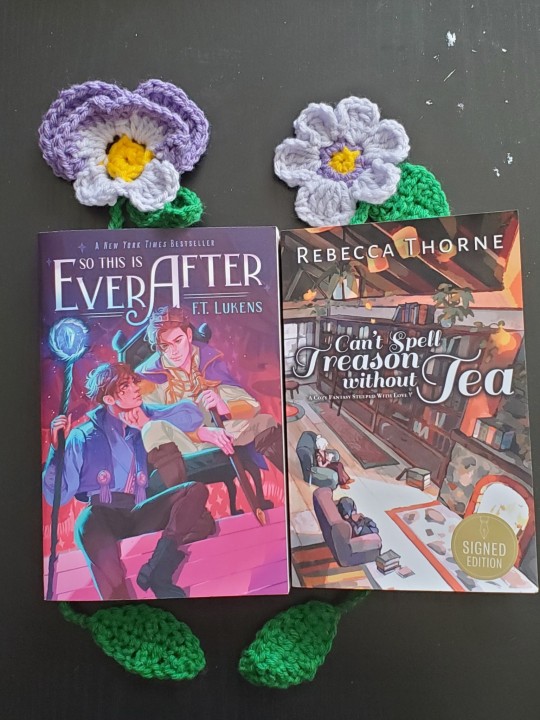
Im about to rant about flowers and gay people so when youre done looking at my awsome flower book marks scroll if you dont wanna read like 4 paragraphs
So fun facts about these flowers in case you didn't already know!! As we all know some flowers mean different things (you can go deeper with floriography which is so neat) and they are just generally used in symbolism. We know lillies, specifically white ones, are used for funerals (at least in the west) and red Roses are for love we assign flowers and plants for roles often times by their looks, locations, and histories.
First we will talk about the Violet. So back in yee olden days in ancient Greece around 600-500 bce there was a poet named Sapho. She is important for a couple reasons 1) she was a woman and misogyny has been around since before Jesus (literally) ancient greece had some cool stuff and had some cool policies like that they (from what ive read) were pretty considerate of different religions even having some temples for immagrants for them to pray in but they also had stuff like slavery and generally hated women. And 2) she was the first ever documented woman who explicitly liked other women and wrote about it.
Sapho, being the pretty popular poet she was, made poems about her love of women and in one of them she talked about a beautiful woman wearing violets. That line is where we get the connection of violets to lesbians (and wlw people in general). People have refrenced her violets a lot in history some have also used diffrent purple flowers as well to show their love to other women.
Next we got the Pansy. This connection has been around for at least a little over a 100 years. Pansy has been used as an insult for queer men bc theyre delicate flowers and such and grrr flowers are feminine men are are big and strong hrumph. The term "pasny craze" was made in like the 20s bc queer people were really coming full swing well not really but more and more people knew of our existence and they weren't happy about it (shocker i know). To sum it up its more of a reclaiming something that was used against us there was even a bar named after the flower. To add on there is another flower used to represent gay men and this one was a bit more like flagging. This being the Carnation(my personal favorite flower) specifically the green one. The one and only *Oscar Wilde* wore one in his breast pocket which in turn trickled down to the every day gay mans consciousness.
Maybe we should think about flowers more i know i do. I cant grow a garden bc i dont like to go outside and bc the sun here is evil but someone should grow a gay garden for me. That would make you a real horticulture lad *ba dum tisk*
Bla bla bla rant info dumping all in all i crocheted gay flowers and put them in their respective gay books
- xoxo gossip girl
#i thi k queer history is soooo interesting#its been one of my hyperfixations#this is mostly me ranting so if it reads weird uuuuuh idk#i love floriography <3333#also applying our names and concepts of sexuality onto people not of our culture and from like 2000 years ago isnt the best idea bc#again she was from 2000 years ago and a real person. that is to say its said she had loved both men and women. ovi shes very important to#the lesbain community shes literally why we use the term lesbian and call the romance sapphic#idk i just wanted to pit that out there#also i forgot to mention “horticulture lads” was also an insult for gay men in the early 20th century thats the reference#im not good at having a coherent long conversation that doesn't go all over the place you can really tell in the end#its a perk to being on the spectrum#i havent read so this is ever after yet but the description is so interesting#im still on like ch5 of cant spell treason without tea and its soo sweet theyre so gay and in love<3333#ive never watched gossip girl idk why i wrote that
2 notes
·
View notes
Text
queer armys could literally just be like “as a queer person many of the themes and symbols bts use prominently in their art feel very familiar, personal and comforting” and would still get jumped by cishets/bootlicking lgbt armys calling them freaks. Oh wait that literally does happen
#literally no one is saying 'wow this photoshoot 100% means jm is bisexual and nonbinary without a doubt'#bts continually make deliberate choices to use specific themes symbols colors imagery etc that are strongly tied to lgbt history#and common queer experiences#no one is 'assuming' anyones sexuality or gender lmao we are recognizing historically QUEER signals and interpreting them#through the lens of our own lived and shared experiences as members of the lgbt community#you know like how you might nonverbally communicate with other queer individuals to establish a base level of solidarity and safety#in a potentially unsafe or uncomfortable environment#it makes me so sad that ppl interpreting 'ambiguous' imagery/motifs/symbolism as queer produces such a vile and hateful response#especially from ppl who are supposed to be part of your community your SAFE SPACE to engage in discussions of queer issues and topics#they love to bring up 'well you all tried to change jm's pronouns remember?!?!?' when that was literally Two people#who literally every other trans army also condemned and disagreed with. that is not the airtight argument you think it is#and it has nothing to do with queer interpretations of bts' personal artistic choices#this makes me so upset i just hope queer armys never stop talking about the comfort that bts bring us through their art#aeron.txt
8 notes
·
View notes
Text
I feel like people don't understand how easy it is to fall into exclusionist thinking. Like I was a super accepting kid when I first realized I was queer. Once I realized I was trans, the story really shifted. And I fell into that thinking that their needed to be a certain way of being queer and trans. I needed to fit into a mold. So much of that came out of the fear of homophobia and transphobia. Especially as someone who got harassed and mistreated to the point of detransitioning.
When you're scared of being queer, you'll so desperately attach to anything that help you seem as the "good gay" the "good trans" but something I had to learn about the hard way, was it didn't matter how much I tired to be queer to their liking. They were never going to like it. I could fight and bully my fellow trans and queer people for eternity, but I was never going to fit into whatever mold they wanted.
It's so easy to fall into that thinking. It was especially easy to see so much hate online or other queer people telling you "no its actually not right to be this type of queer or this type of trans. It's problematic." There was so much hate surrounding me in both public and online.
But the thing was? one of the biggest things was being around other queer people. Especially queer elders. This isn't always an easy request, like I know the circumstances can be challenging to for people (I mean I'm an adult disabled queer person living at home, in the same area, with my family and there is absolutely no public transport 😭😭 I know for sure about that)
But hopefully, you'll be able to connect to other queer people eventually. Until then? just step outside of the online bubble. Learn about queer history (omg I'm BEGGING!) Take time to evaluate your beliefs. I just think it's so important.
I know that exclusionist can't be excused. The harm that they've done to the community has been detrimental. But I hope that this shines some light that people can change. That even when people fall down, that rabbit hole. There is a way to climb out. Trust me. It takes work. But I have hope that with these more open conversations about exclusionism and support of "problematic" identities. We can help find their way out. Even if it's just a few. I think that it's important we try? yknow?
#I hate talking about when i was into exclusionism.#i feel very very ashamed about it#I know i hurt my fellow trans people#but I'm glad I've been learning and growing#i love queer people i love our history and community and i was us to grow and learn#i hope we're able to strengthen from everything#we need community and connection more than ever right now#I hope this just helps people see hope in this#jaymes talks#queer#lgbtq+
2 notes
·
View notes
Text
OFMD has officially been cancelled, and I am once again thinking about all the people in the world who nitpick diverse media to hell and back when it isn't 100% perfect, as if having nothing at all would be preferable.
I'm so fucking tired of good, earnest, diverse media getting held to ridiculous standards by both networks AND fans, and then getting cancelled.
It was supposed to be three seasons. David Jenkins fucking said it was supposed to be three seasons. And then the network dragged its ass on renewing for season 2, and now...no season 3.
FUCK this shit. I'm so tired of media by and for marginalized artists getting fucked over. I'm tired of marginalized people fighting for scraps and then getting the rug whipped out from under us.
Yeah, OFMD isn't the only thing out there. There are other things to go enjoy, for the moment. But the fact that it's the shows that are queer and multicultural that keep getting cancelled is pretty fucking transparent, and I've seen quite a lot of concern from people in the industry about the direction we're headed. The outlook is concerning. It's more important now than ever to support marginalized artists, whether they're making indie art or trying to get something made by a mainstream studio.
Our Flag Means Death. Warrior Nun. One Day At A Time. Willow. Dead End: Paranormal Park. First Kill. Q-Force. The Owl House. Steven Universe. A League of Their Own. Vampire Academy. I could go on, but I don't need to, because there are entire lists that have been curated by news sites: Gay Times, Out, Autostraddle, Pride, Movieweb, Collider.
There's a reason I spend so much time and energy studying things like the Hays Code and the history of censorship. This shit comes in waves, and the only way marginalized artists survive it is through community support, mutual aid, and being really goddamn loud.
So be loud. Make art. Support your fellow artists and the artists you love. We need each other if we're going to weather the storm.
2K notes
·
View notes
Text
Transmasc Tumblr, I need you.
I dunno if there's a rallying cry or some kind of ancient incantation I gotta bust out, but HEY TRANSMASC FOLKS AND TRANS MEN, EXCUSE ME PLEASE.
I'm a trans dude with a small-ish YouTube channel working on a video about the erasure of transmasculinity, particularly in the wake of the recent debacle involving a former YouTuber who I won't mention directly but his name rhymes with Sames Jomerton. His plagiarism of Alexander Avila and Jes Tom, and outright misgendering of ND Stevenson got me fired up about how often we're overlooked or merely an asterisk in queer discourse, so much so that even those of us in this community need to search high and low for resources on our history and health care.
So I'd like to hear from you. If you're comfortable, I'd love for anyone who's part of this community (and not a transmedicalist) to message me directly with something you wish more people knew about us, or an anecdote about one of your experiences (happy, sad, angering, your call.) A paragraph or two is ideal--for longer posts, I will likely not be able to include them in their entirety, but I will quote them where I can. If you'd like to be involved, please let me know if you'd prefer to be anonymous or to have your name dropped and socials linked; I'm hoping for the latter given that the idea is to shout out more artists and creators, but I want to give the anons space to be heard, too.
You can also help by recommending transmasc YouTubers (especially essayists) who could use more eyes! I'm looking for more creators to enjoy personally, and I'd love to shout them out if it would help them.
If y'all could reblog this, I'd be very appreciative, and if you read all of this, dog bless you. 💙 And an extra special thanks to @socksonat3am for being such a great friend with exceptional meme game. He blindsided me with a compliment so now I'm getting him back because he needs to know how talented and delightful and magical he is. Take that, Socks. Get absolutely treasured.
#trans man#transmasc#transmasc nonbinary#trans visibility#transgender#trans#trans creator#queer#leftism#reblogging would be super#hope your day is going great
1K notes
·
View notes
Text
Invitation: Making Queer History in 2024
The urgency around learning and uncovering queer history feels more present than ever. Queer stories are being suppressed globally, and much of that includes the queer community's long legacy. It is easier to erase a group of people when they are unaware of their roots. That's why in 2024, we are inviting everyone to make an active choice to learn more about queer history. That can look different for different people, but here are some suggestions:
Read queer books, there is a reason queer books are being banned. They are powerful tools to connect community, use them. Read them, request them from your library, support queer authors in these uncertain times. (The masterlist linked is an affiliate link)
Follow queer accounts on social media, if possible, social media is a regularity in many of our lives, and it's a great way to keep queerness and queer history present in your mind. Our social media are here on Tumblr, Instagram, Facebook, and Pinterest.
Sign up for newsletters about queer history, email newsletters are a lot harder to suppress with algorithms. https://www.digitaltransgenderarchive.net/ https://www.makingqueerhistory.com/ https://www.glbthistory.org/newsletter https://arquives.ca/
Look for and record queer history in your local community, there are lots of city-specific queer history projects around the world, and they would love your stories. If you don't have stories, see if you can find some. Queering the Map is a great alternative if there is no queer center in your city.
Learn and share queer history with your friends, talking about queerness in history does more than spread awareness it builds a legacy for often forgotten figures.
Support queer history projects, queer history costs a lot of money to research. With academic paywalls, language differences, and active erasure, this job is not easy. Help queer history projects continue by supporting them financially.
As the year ends, most people start thinking about their goals, and many will be discarded as 2024 goes on, which is why I put a lot of options, both long-term and short-term ones, on this list. Almost all of them are immediately actionable, though. You can do them right now on your phone, and I encourage you to. A lot of people talk about the importance of queer history, but the active choice to preserve and uplift history is much rarer. Don't let queer history slip through the cracks, not when so many people are trying to sweep it out of the narrative entirely.
#queer history#queer#lgbt#gay history#lgbt history#lesbian history#transgender history#transgender#making queer history
1K notes
·
View notes
Text
A thought I’ve been having: While it's important to recognize the long history of many current queer identities (and the even longer history of people who lived outside of the straight, cis, allo “norm”) I think it's also important to remember that a label or identity doesn't have to be old to be, for lack of a better word, real.
This post that i reblogged a little while ago about asexuality and its history in the LGBTQ+ rights movement and before is really good and really important. As i've thought about it more, though, it makes me wonder why we need to prove that our labels have "always existed." In the case of asexuality, that post is pushing back against exclusionists who say that asexuality was “made up on the internet” and is therefore invalid. The post proves that untrue, which is important, because it takes away a tool for exclusionists.
But aromanticism, a label & community with a lot of overlap & solidarity with asexuality, was not a label that existed during Stonewall and the subsequent movement. It was coined a couple decades ago, on internet forums. While the phrasing is dismissive, it would be technically accurate to say that it was “made up on the internet.” To be very clear, I’m not agreeing with the exclusionists here—I’m aromantic myself. What I’m asking is, why does being a relatively recently coined label make it any less real or valid for people to identify with?
I think this emphasis on historical precedent is what leads to some of the attempts to label historical figures with modern terminology. If we can say someone who lived 100 or 1000 years ago was gay, or nonbinary, or asexual, or whatever, then that grants the identity legitimacy. but that's not the terminology they would have used then, and we have no way of knowing how, or if, any historical person's experiences would fit into modern terminology.
There's an element of "the map is not the territory" here, you know? Like this really good post says, labels are social technologies. There's a tendency in the modern Western queer community to act like in the last few decades the "truth" about how genders and orientations work has become more widespread and accepted. But that leaves out all the cultures, both historical and modern, that use a model of gender and sexuality that doesn't map neatly to LGBTQ+ identities but is nonetheless far more nuanced than "there are two genders, man and woman, and everyone is allo and straight." Those systems aren’t any more or less “true” than the system of gay/bi/pan/etc and straight, cis and trans, aro/ace and allo.
I guess what I’m saying is, and please bear with me here, “gay” people have not always existed. “Nonbinary” people have not always existed. “Asexual” people have not always existed. But people who fell in love with and had sex with others of the same gender have always existed. People who would not have identified themselves as either men or women have always existed. People who didn’t prioritize sex (and/or romance) as important parts of their lives have always existed. In the grand scheme of human existence, all our labels are new, and that’s okay. In another hundred or thousand years we’ll have completely different ways of thinking about gender and sexuality, and that’ll be okay too. Our labels can still be meaningful to us and our experiences right now, and that makes them real and important no matter how new they are.
We have a history, and we should not let it be erased. But we don’t need a history for our experiences and ways of describing ourselves to be real, right now.
#stars has thoughts#i'm not letting the exclusionists have this one#'it was coined on the internet' 'it was only coined a few (read: in the case of aromanticism almost 20) years ago' true. so what?#that doesn't make it less real#i hope what i'm getting at comes across here#(and that it doesn't sound like im trying to invalidate all LGBTQ+ labels lol. i'm trying so hard to not do that)#labels are social technologies. if they are useful here and now then they are useful#we are using technologies that are new and innovative and useful to us in this time and place#in other times and places they have not always been and will not always be useful#but that's true of any technology. doesn't mean we don't get to use them now#queer#aspec stuff#aro thoughts
276 notes
·
View notes
Text


Hi Tumblr!
I logged da fuck off at some point and will continue to be very much so not on social media! Believe me when I tell you life is better on the other side.
I do want to pop in with a life update for the curious!
I'm out here in Durham, NC, and three years after moving here with Shelby and Brian, I can confidently say there isn't a place in the world I'd rather put my roots down.
I never knew what actual community looked or felt like until I came here. I'd made friends in town everywhere I'd lived, of course, and we would go out to eat or on a vacation, visit a gallery or something, but in Durham it's just different. Looking out the window during a car ride, chatting with a stranger in a grocery store, checking out a thrift shop or going to the library, I find myself declaring "I love living here..." the same compulsive way I tell my partners I love them. Durham isn't just a place I live, it's where I belong.
I've been calling myself an ex-cartoonist, and preaching the nightmare of trying to make art for infinite-profit focused megacorps. It's not that I didn't love making cartoons, it's that I did. It may not be that way for everyone, but for me, working a job I loved meant I was working every second of my life. Being an artist is a core part of my heart and soul, and near the end, I had become so burnt out I would spend hours just trying to start doing the work I used to fly out of bed excited to do.
So I did some of this and that, worked a retail job that fucked my hands up so bad that I had to have double carpal tunnel release surgery. 29 years as an artist and I get carpal tunnel from hefting around boxes in a warehouse!
Since then, I've pivoted into building a career as a graphic designer. (And I'm learning web dev too!) I'm getting involved in the local nonprofit scene, meeting so many incredible people and finding so many cool and exciting opportunities to focus my design work on community awareness, nonprofits, small businesses!! I didn't expect that to be so viable for a Graphic Designer. I had the misconception for a long time that I'd have to put my creative sensibilities aside for more dry, sensible corporate phooey. But there's so much more.
Graphic design is truly a delight and a challenge! I have always enjoyed thinking critically about all forms of human creation. Why am I so drawn to this book cover? What makes that building so weird? Why do these casserole mix boxes piss me off? Why does that person's outfit look so fucking awesome?
Taking those thoughts and using them to inform how I approach design is an entirely different beast from animating and illustrating. I'm fighting for my life out there formatting text, morphing vectors and and scooting things around a comp until it works. A picture's worth a thousand words, but you don't have space for a thousand words in a graphic design. Condense! Condense! It's challenging, and a lot of fun.
Working as a cartoonist was my dream come true, and I am forever proud of and thankful for the part I have played in the history of animation and queer representation in entertainment. I had the privilege of having the life crisis I had at 21— "I never thought I'd get this far. What more could I want? What do I do now?"
Well, a decade later I confidently know what comes after having my dreams come true. I get older, and I experience new things, meet new people, struggle paying bills, endure all kinds of misfortunes and problems, and come out the other side astounded and proud to have survived it. Grow closer to my family friends and community as the years deepen our history together, and just be amazed and thankful that I made it this far, over and over.
It's funny being called old by my younger friends, because I have never felt so young in my life! I JUST cracked 30. There are so many things I haven't done yet, and so many things I don't know that I don't know yet. And I have the power to take ALL of this and to create art about it. Hopy shit!
Speaking of making art and sharing it, one of the reasons I'm excited to be learning web dev is so I can carve out places online where I can share anything and everything I want to. Media Crit, comics, essays, comics, illos, however I want to present it. I'll share it when I get the site running. Or maybe I wont and you'll have to find it by chance.
And of course, I'm still actively writing Neokosmos with Shelby and Brian, and doing other little things here and there. :)
See ya when I see ya,
Danny
338 notes
·
View notes
Note
I heard a raw line from Guilllermo Del Toro the other day about monsters being the perfect way to express human failure:
“…monsters, I believe, are patron saints of our blissful imperfection, and they allow and embody the possibility of failing.”
And i was wondering your take on this quote in relation to things like vampire and werewolf and other semi-monster subtexts. “Monstrous” humans that are ironically allowed to act more human more often than… humans. I just find the attempt to make an outlet for imperfection while still at large criticizing it fascinating.
I mean, yeah, there's a long history of interpreting monsters through queer, anti-colonial, feminist and other Outsider lenses for exactly those reasons. The monster is the Other who is vilified by the in-group, which represents all that the in-group hates. The monster must, by its nature, fail to live up to the standards and expectations of the in-group, which is why it must be destroyed. But that also means the monster is free from the standards and expectations of the in-group, including oppressive and bigoted ones.
So, as an example, if you're queer, and rhetorically treated as inhuman and monstrous and diseased anyway, or eugenically classified as a deviant mutation or sub-derivation of "real" people, there is real appeal and a real sense of resistance in claiming monsterhood, in embracing it and glorying in it.
In part, that's what the rallying cry "we're here, we're queer, get used to it!" meant and still means. It is a reclaiming of monsterhood as a source of strength and community and pride, rather than shame. Slurs are used to Other queer people, to set them apart from "real" people and mark them out as a monstrous deviation from the virtuous norm - slurs are used to call us monsters. And thus a lot of queer people find a lot of power and freedom in reclaiming them, in turning their Othering into a flag to rally around.
And I think that's still a big part of the appeal of the monster, honestly, that freedom from being what someone else thinks you ought to be.
If you're a monster, you don't have to have the perfect body, you don't have to suppress your lust or your love. You don't have to shave your body hair or dress correctly for your assigned gender, or have a white picket fence house with a spouse and 2.3 children. You don't have to sit primly at the dinner table, you don't have to repress your emotions, you don't have to hate the foreigner or despise the gays or fear the trans agenda. You don't have to have a small, straight nose or perfect cheekbones, you don't have to wait to fuck until you're married, or pretend you want to fuck at all. You don't have to want to get rich or be a CEO, you don't have to pull yourself up by your bootstraps or be on your grindset, or cheer when the cops clear out a homeless camp.
To be a monster is to be free from the inhumanity that is forced on us by white supremacy, by fatphobia, by heteronormativity, by imperialism, and by the interests of capital. To be a monster is to be human in all the ways that are inconvenient to oppression.
... but I went off on a tangent there a little bit - vampires and werewolves, right. I have no theoretical or academic basis for any of this, so this is entirely a personal hot take, but I think vampires are perhaps a bit more about "passing" as a fantasy. Not necessarily in a gender sense, but the ability to keep your true nature undetected by the "normal" folk, while the secret things that make you different also make you dangerous and powerful. Surviving by stealing sustenance from a world that hates you, on terms that are entirely yours to dictate. "I will survive even if it kills you," that kind of vibe.
Werewolves, on the other hand, feel more like a defiant, angry embrace of the monstrous. Transforming into something vast and powerful and furious, growing out of your skin, out of your form, out of your boundaries; howling your nature to the moon and mauling any motherfucker who has a problem with it. Giving in to all the beastly unnatural urges, and diving into the horrible monstrous wants and desires that boil inside you (which, remember, include things like Not Wanting To Fuck or Wanting To Hold A Girl's Hand In A Lesbian Sort Of Way). Less the "I outfoxed your social game and drank you dry" slick vampire power fantasy and more the "call me a slur one more time and I'm going to wear your entrails like a fucking scarf" power fantasy.
Again, that's just personal hot takes, everyone's understanding of the monstrous in relation to themselves is different. I've seen a number of genderfluid and nb people use monstrousness as a way to defy occupying a shape that can be gendered for example.
797 notes
·
View notes
Text
all right. i'm ready to talk about izzy.
izzy is a great character. in s1 he sits in this great position as an antagonist that's close to the main characters, and in s2 he sits in this great position as an antagonist who's gotten everything he wanted, and found that actually - fuck! - that's not it at all. the world changes enough in s1 that there's no satisfaction in izzy getting what he wants out of blackbeard. and it's not just ed that's changed, it's not just the crew, izzy himself is fundamentally changed too. even before s2, and that change continues to grow and flourish through the series.
in reality, death is cruel. and death is senseless. and death is unfair, and shitty, and it happens to the wrong people at the wrong time, too early, with too much to live for, who mean too much to too many. it happens.
maybe izzy's death is all of those things, but i don't think that's the point. it's not meant as a lesson in mortality; it's not meant as retribution for past crimes; it's not meant as a commentary on who deserves to live and who deserves to die. it's not about deserving. if anything, it's about the fact that deserving doesn't come into it at all.
the point is that izzy healed.
a lot has been made of the fact that izzy is the only character who bears visible scars from the kraken era - the scar on his head, as well as the leg. but i don't think they're meant as a reminder of the injury, or as a sign that izzy is "damaged" post-kraken era. they're representative of the fact that izzy healed. the scar is there to remind you that izzy survived. you see it heal over multiple episodes because that's the work izzy is doing - he's healing from blackbeard's actions, from his own actions, from his history, from his constraints.
it's not too late to heal. it's not too late to find your place. it's not too late to come out. it's not too late to let people in. it's not too late.
and all those things are worth doing despite the fact that our time here is limited. we are all going to die. but we are here right now, which means it's not too late, and it is worth it to free ourselves to be who we need to be regardless of who we have been and who we are now and what time we might have left.
izzy isn't suicidal in ep 8. he's healed from that. izzy isn't abused or depressed or alone in ep 8. izzy is strong, and competent, and respected, and loved.
and some folks have been disappointed it's not romantic love. i get that. but i think it's super important too that izzy's healing is worth it without romantic love. familial, platonic love is so fundamentally important to the queer community. found family. friends. solidarity. the look when some stranger sees you and you see them and you both know the other is family, that they're safe. the way we fight for each other - for our rights to love who we want, fuck who we want, to marry, to adopt kids, and also for housing, for jobs, for healthcare. for our rights to use the bathroom, for our rights to choose our own names and our own bodies and our own families. we're fighting for our right to exist and that, guys, it's not romantic. the foundations of our community is about - well, i'll let izzy say it:
it's not about glory, it's not about getting what you want. it's about belonging to something when the world has told you you're nothing. it's about finding the family to kill for when yours are long dead. it's about letting go of ego for something larger. the crew.
ed and izzy, following s2e3, interact and communicate on izzy's terms, and that's made clear. that's the last relationship for izzy to heal. when izzy finally approaches ed in ep 6, it's - not great. it's a start. you gotta start somewhere. he lets ed apologize, in their very closed, guilty way of speaking to each other, but then goes back to the crew, back to his safety.
he finally finishes his healing arc with the drag performance and la vie en rose, and then he and ed DO have good moments. he teases ed about stede. he directly reverses his previous actions in s1 and tells ed to listen to his good feelings. that's where djenks is getting this (imo, still a bit weird) father-figure business. the scene in the republic where ed's watching fishermen and izzy comes to say hey, it's all right, hey, listen to your gut. they don't need to directly come out and have some deep serious conversation about their relationship because that's just not like them, man. they're doing their healing their way. i think it would be nonsensical to expect these two to be open and honest with each other regardless of how they are with everyone else because their relationship is not like their relationships with anyone else.
until they run out of time.
and this, i think, is important. izzy controls this last conversation because it's what ed needs to hear, because izzy no longer needs to hear it. izzy doesn't need to hear that ed's sorry, izzy knows ed's fucking sorry. ed's whole arc this season is about the guilt he's carrying. izzy says what he says because he knows ed needs to hear it. ed, you weren't a monster all on your own. ed, i saw you. i saw you outgrowing him, and i didn't want that to happen because i was worried about what it meant for me, but i see now that it could have meant this all along - family. balance. something to die for, sure, but something to live for.
you could argue that ed and the crew don't think of each other as family. i think it's a bit more complicated than a yes or no on that one, but when izzy says, ed, you're surrounded by family, maybe it doesn't matter whether that's fact. maybe it's a statement of possibility. look at this family who can love you if you let them. look at this family who will forgive you even when you don't deserve it. look at all the ways you can still heal. look at how worth it it all is.
just be ed, izzy says, there he is.
he says it to ed because izzy already knows he can be just izzy. izzy already knows he's dying surrounded by family. izzy already knows that love and belonging and family are worth it, and he uses his dying moments to make sure ed knows it too because despite everything, despite everything he did and despite everything ed did and despite not being ed's romantic choice, he loves ed. it's worth it to use his dying moment to make sure ed knows this because izzy loves him.
it's worth it.
izzy is the stand-in for the stereotypical pirate, the villain - the representative of how repression and oppression work together, of how race and class and colonization interact with each other, of the lines between love and obsession and power and rage and fear blurring beyond recognition - and he heals. guys, the point of his story is not that he was all those things and paid that price. the point of his story is that he could grow beyond all those things and that growth and healing was all worth it despite the fact that yeah. our lives will inevitably end.
historically, israel hands is said to be one of the only major pirates who survives the golden age of piracy, and he doesn't survive it well - according to the contemporary account of "captain charles johnson" (almost certainly a pseudonym) in A General History of the Robberies and Murders of the most notorious Pyrates, published 1724, hands dies a beggar in london sometime between 1719 and 1724. it has been suggested by some pirate scholars that hands may have actually been the source for much of the information johnson is able to relay regarding blackbeard - and that johnson's apparent wealth of information contributed significantly to the legacy blackbeard left behind and his lasting fame. i had actually really hoped to see this play out in ofmd - izzy protecting ed and stede through perpetuating stories about blackbeard's 'death' (fake, i'd hoped) and legacy.
but i think - he is. in his way. he's there on the hillside, keeping watch. he's there to hold all the stories and all the memories of pirates and what it meant to belong to something, even as the golden age of piracy sets. he's there to show what it is to love and to be loved in return: eternal.
i don't like that izzy died. i think he's a great character, i think he's great fun to have in the ensemble, i think his dynamics with ed and stede are so fucking chewy and delicious. i think con o'neill has done the work of a lifetime on this character and, i hope, had and continue to has the experience of a lifetime with this fandom. my heart goes out to those of you who are devastated; i've been there in past fandoms, i know how achingly difficult that is. i'm so sorry.
but izzy's story is worth telling. izzy's story is worth celebrating. izzy is about making mistakes - bad mistakes! - and finding your way back to something better. izzy is about healing, and about community, and about hope that even when things are shit and people are shit - they can change. things can change.
and maybe - yeah. it's about the role stories play in our lives. about using fictional little scenarios to deal with our traumas. we're here. we're alive. we're coping. we will heal.
not moving on is worse.
729 notes
·
View notes
Text
Last night's episode of 4 Sided Dive was absolutely wonderful in terms of the amount of insight and perspective we got. Not only the Crown Keepers interlude, but also for campaign 3's themes as a whole.
Specifically what fascinated me though, was the incredible analogy Aimee drew between the Ruidian culture and colonial influence on indigenous/colonized spaces in real life (around the 1h32m mark for reference). It was amazing question to ask and I'll love Aimee endlessly for it because it touches on am interesting parallel between the discourse surrounding the Exandiran gods and what they thematically can represent to us as an audience.
Before I dive into my thoughts, I want to preface this by saying this is my specific perspective as a queer woman of color and daughter of a refugee. While my year-5-in-a-PhD-program brain may just be over analyzing this too much, what Aimee brought up just deeply resonated with me in a way that I don't really see talked about in discussions around the themes of campaign 3. Additionally, the ideas I'll be talking about borrow heavily from Christine Taitano DeLisle's Placental Politics: CHamoru Women, White Womanhood, and Indigeneity under U.S. Colonialism in Guam (2023). Its an incredible piece on indigenous knowledge production and political action that importantly looks to decenter colonial perspectives and history (and more importantly recenter indigenous histories, knowledge, and perspectives in a way that allows us to dislodge the idea that colonialism is something that is immutable and inevitable.)
To quickly summarize Aimee's point/follow up question, she pointed out that the way Ruidians have engaged with, repurposed, and were resentful towards Exandrian cultures mirrors some of the real life experiences of colonized/marginalized communities in relation to colonialism. It was such a powerful comparison to make because in a lot of ways, the struggle of the Ruidian people over the course of the campaign along with the looming question about the gods and whether or not to save them is (intentional or not) deeply resonant with the idea of colonialism and the ways it is deeply ingrained in the even mundane aspects of our life.
In a lot of ways, the Exandrian pantheon can be seen as a colonial force. One that came in and displaced a preexisting order of things and entrenched itself in the new way of being it established. Ashton and Laudna have repeatedly pointed this out throughout the campaign. There was life and existence before the gods. The gods are merely a different mode of being, not the only and inevitable mode of being. Life, society, and being can and did exist without them.
And its important to recognize that aspect of the gods, because it helps us understand their motivations that much better. Aabria in her description of what Opal saw in the Spider Queen as she tried to take Opal as her champion was poignant. Opal did not see an omniscient, unknowable entity. She saw a woman. A woman who was frustrated, angry, and most importantly frightened. They keep Predathos chained away not to protect life on Exandria nor because they feel a moral obligation to do so. They are doing so because they are afraid. Their mortality is at stake. And, as Aabria keenly pointed out, their pride is as well. Every action, every move is out of self preservation. An attempt to save themselves because Predathos demonstrate that not even the gods are a permanent thing.
You'll find (as Anne Stoler writes about frequently) that colonial systems are much the same. They are vehemently intent on self preservation. Any action they undertake and any narrative they create about themselves is solely done to preserve the way things are currently. And that includes narratives that the way things are currently is somehow inevitable. That things were always coming to this moment. Often, this is done at the expense of framing other modes of being as somehow antithetical to the way things are now. That it needs to be this way. And that this way is right and forever.
To me, its important to recognize these parallels. While Ruidians may engage with, adapt, and innovate off of Exandrian ideas, culture, and art, it is only because - as Aimee aptly phrased it - Exandrian culture as a direct result of the gods actions has "sucked all the air out" everything. What is there to engage with, if not the looming orb in the sky that has shaped every aspect of their existence?
It really brings the campaign-wide question of "should we save the gods?" into new light, at least in my opinion. Because its suddenly not about "saving the gods in a morally righteous act to preserve all life." It becomes a layered and complicated network of issues that makes the answer to that question incredibly difficult to answer. Is preserving the status quo because its how things operate now worth it at the expense of the suffering of others? What would saving the gods and the Ruidians look like? Is it even possible to save both? What changes to how things operate would be a result of that? How would those changes be handled?
I bring this up because there is a tendency in some discourse that I've seen to frame questioning the validity of saving the gods as inherently the "wrong" choice to make. When instead, when you see the cast struggling over the question, its because the answer is not straight forward. The gods are not necessary for life. They never were. They just are necessary for life the way things are now. And the question of what disrupting that means is such a fascinating one to engage with.
#4sd#4 sided dive#critical role#cr#Bells Hells#look im probably thinking way too hard about everything#but aabria and aimee were so amazing to listen to last night#and brought in such amazing insight!!
256 notes
·
View notes
Note
What's up with batman and the erasing of queer history? Sry I try to interact with fanon as little as possible
There is no simple or short answer to this but to try and not make it a wall of text - Batman/Robin has always been a staple of the queer community, so much so that to this day there are "brudick" graffiti in big cities and lots of older gay couples have been using them as a reference for solid partnership which endures in spite of adversity.
Originally there was no indication anywhere that Bruce and Dick were in the roles of father and son, rather they were partners against crime, one the shadow of the other, and they would share everything both when it came to crime fighting and in their everyday lives. They're shown sleeping together, going on lake trips together, finishing each other's sentences and Dick being viciously jealous every time Bruce would "replace" him with any of the women he used to have flings with such as Talia or Selina.
Did DC mean for them to be read as a queer couple? No, of course not. Bob Kane and others wrote a partnership, an unbreakable bond which would allow these two men to overcome any obstacle together, and queer people read into it as queer people always do.
Someone else read into it though: Frederick Wertham, who called Batman a pederast and used Batman and Robin as an example of how the evil comics would corrupt young minds to send them on the way of perdition and sin. He wrote all of this and many more infuriating shit in his book Seduction of the Innocents, which was then the major influence in creating the Hayes Code, which is the reason why we never had queer characters in comicbooks and movies and anything really for decades (and we're still struggling today).
Wertham and the Hayes Code did not stop the queer community from loving Batman and Robin though, therefore what started happening was the more subtle shift towards Bruce and Dick having a father and son relationship rather than a partnership. You can see this clearly with Jason Todd for the first time: Bruce takes Jason in and treats him as his own son, the narrative calls them father and son, and there is no doubt in the mind of who's reading that Bruce perceives Jason as his child. It all went steadily downhill from there.
Nowadays, writers have Dick say character assassinating things like "I love you dad" to Bruce, Tim saying "we will save our dad" to Damian, and everyone in the fandom acting like this has always been the case and actually you're weird and you should be sent death threats for shipping Brudick, because "UMMM that is literally his son?!??!?!?". DC has been pushing the idea that these folks are a nuclear family for a while now, but whoever has actually read the comics knows it's not the case, and it used to be very different before.
Brudick, among queer people, used to be entirely uncontroversial. While Wertham raged about how it corrupted the minds of young men and the Hayes Code prevented queerness to be anything but vaguely hinted and coded in the text, queer folks didn't care and kept having matching Batman and Robin shirts.
Today queer people will call you a pedophile and a groomer and try to doxx you for posting Brudick art because apparently they're doing the fascists' job for them, either because they are genuinely misguided or because they think that if they're enough morally pure they will have a spot among the chosen ones, hell if I know.
What I know is that they'd suck Wertham's cock and balls if he wrote Seduction of the Innocents today, and it's DC's fault too with their erasure of every found family dynamic among the batclan, and the way they've been pushing the idea of a "batfamily" instead, in which everyone has a strict role of son or brother or father, and shipping them makes you the antichrist.
#I personally don't even ship brudick#and the ships between bats and birds don't do much for me in general#but I see the devastation caused by how queer people police and censor (and abuse) each other#on the basis of preserving the sanctity of a family that doesn't exist and it's not even a family#my asks#my meta#dick grayson#bruce wayne#brudick
159 notes
·
View notes
Text

Today on popping the corn and feeding the children, what do you folks think of this discussion? :)
I'm always curious to hear what other Trek fans, especially queer Trek fans, think about our place in Trek history and how we fare as the queer participants within our fandom. What have your experiences been like?
Overwhelmingly I've found a great reception and a welcoming attitude, but I admit that has increased considerably since the 90s. However, there are still some Trek fans who seem to be vehemently in denial about queer history in Star Trek, or the fact that anyone who has worked on Trek has pro-LGBT attitudes. This always surprises me considering some of the blatant queer content we have already seen in Star Trek such as the Jadzia Dax and Lenara Kahn kiss.
Anyway, I enjoyed the discussion that followed and seeing the overwhelming outpouring of support coming from Star Trek fans in response to this thread.
Here was my two cents contribution:
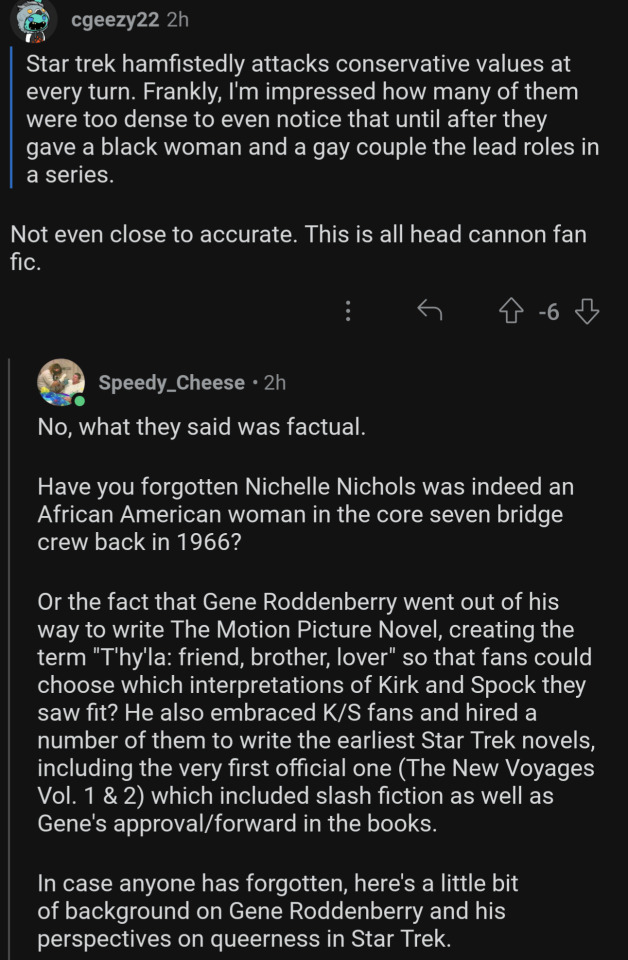
"No, what they said was factual.
Have you forgotten Nichelle Nichols was indeed an African American woman in the core seven bridge crew back in 1966?
Or the fact that Gene Roddenberry went out of his way to write The Motion Picture Novel, creating the term "T'hy'la: friend, brother, lover" so that fans could choose which interpretations of Kirk and Spock they saw fit? He also embraced K/S fans and hired a number of them to write the earliest Star Trek novels, including the very first official one (The New Voyages Vol. 1 & 2) which included slash fiction as well as Gene's approval/forward in the books.
In case anyone has forgotten, here's a little bit of background on Gene Roddenberry and his perspectives on queerness in Star Trek.
He admitted that in his early life he was very affected by how society and culture treated the LGBT community, and that he too found himself subjugating and judging others for that lifestyle because it was what people did at that time. As he got older and had more life experience, he began working with a number of queer artists in Hollywood -- and through TOS, a number of queer individuals began asking questions about Kirk and Spock.
Instead of vehemently shutting down this perspective, Roddenberry was intrigued, and saw potential to tap into a large audience (LGBT) that most others didn't want to go near or acknowledge publicity-wise. He saw it as an opportunity to expand the fanbase while also pushing yet another envelope.
But with the heat already on the show for what they'd already pushed, he found he was often stuck between what he'd like to do and what production would let him get away with. There are a number of Kirk and Spock scenes in scripts that got cut out for leaning a little too obviously romantic. Tiny trickles of that content still made it in were infamous moments like the backrub scene in Shore Leave. Even the 2009 movie had a K/S moment while Spock Prime and Kelvin Spock talked that was written and filmed that was cut out of the final product.
Queer subtext and coding has always been relentlessly weeded away at with an excuse ready to go for why they always try to cut us out, but we all know it's because they are scared of the homophobic backlash and ratings hits. Look how violently homophobes went after the gay romance episode of The Last of Us **just this year**. This has always been our reality, so for someone like Roddenberry to make efforts in the 70s? That was massive.
But Gene as well as the queer/slash Trek community managed to accomplish some things in the 70s which I'm surprised more folks don't talk about or give much credit.
In the same TMP novel which features "T'hy'la" and the famous footnote, Gene cleverly wrote Kirk with a bisexual/pansexual lens: Kirk describes himself as *preferring* women but being open to "physical love in **any** of its many Earthly, alien, and mixed forms." (Direct quote from Genes book). Basically, Captain Kirk was DTF with whoever if there was a connection, which was a very progressive take for a character in a novel written in 1979, but made sense for the future which would have a lot less hang ups about sex and love compared to our current rather puritan/conservative society.
I also prefer women, but I married a man. Shout out to Gene Roddenberry for giving us a seat at the table back in the 70's when folks *still* try to insist there is no place for K/S or queer concepts in Trek, because he made efforts -- however small -- to employ queer people and show queer perspectives. According to David Gerrold, LGBT+ representation was a big thing that Gene personally pushed for in TNG and wanted various depictions of love/couples in the Risa scenes, to name one example.
In the 70s, fanzines led to meetings and swapped fanmade magazines, which got so big that they needed hotel centers, then convention centers, then one day the TOS cast came to one and what we know as modern fan conventions were born -- inspiring even George Lucas who attended Trek conventions in the 70s and saw how popular Trek was in syndication; it was a great climate to launch his Space Opera. Star Wars then became so huge that we got TMP.
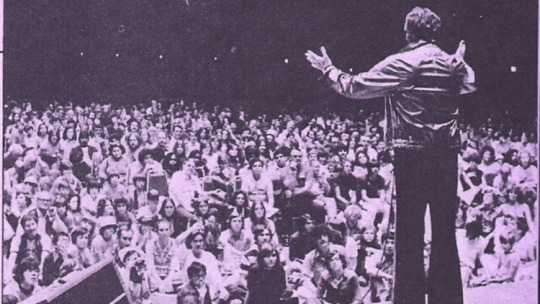
But none of that would have happened without the level of organization, passion, and creativity that those fans poured into Star Trek and their characters after it got cancelled and went into syndication.
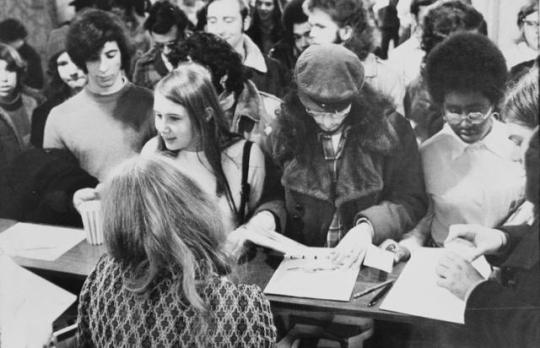
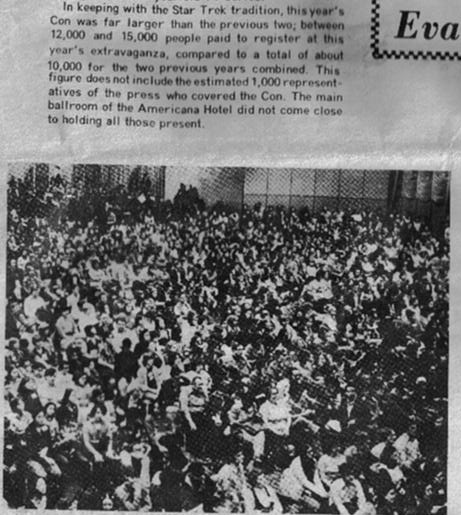
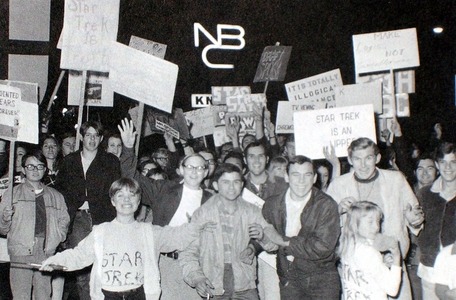
Without queer folks we wouldn't have George Takei, Theodore Sturgeon who gave us Tribbles, Bill Theiss and his amazing TOS costumes, Mike Minor's art direction, Merritt Butrick, David Gerrold (writer for TOS, TAS, TNG) to name a few of many queer contributors to Trek that Roddenberry respected and tried to go to bat for wherever he could in a climate that was absolutely impossible to gain an inch in.
At a time during the 70s and 80s when so many people resented and feared the queer community and wanted us to disappear, especially in the 80s during the AIDS epidemic which many homophobes claimed was "God's punishment to the gay community" or "Gods's answer" to our "hedonism", thinking we'd gotten our just desserts and should just disappear . . .
During that time, Gene Roddenberry gave us queer folks a place to say: "You know what? Sure. Write your stories. TV says you guys shouldn't exist, they pull books with queer people off the shelves and burn them. Laws exist specifically to forbid you guys from loving each other, and call you mentally ill. You can't even hold hands in public. But I'm going to validate you guys and invite you to write novels or work for me, try to see what we can get by production, and allow you to see yourselves in my characters if you want to. There's a place for you in our fandom."
He gave us bi/pan Kirk, he gave us K/S is open to interpretation. In Phase 2 Kirk's surviving nephew Peter, son of his brother Sam from Operation: Annihilate!, was going to be written as gay and living on the Enterprise with his partner -- that also got chopped and reworked into a script that wouldn't get used until decades later. That was huge at a time that being queer was officially listed as a mental illness, and villainized due to the AIDS crisis.
So before you try to dismiss or tell K/S + queer Trek fans whether or not they deserve a seat at the table, remember that Gene Roddenberry was among the **first** to pull that seat out for us in a climate that was ruthlessly against LGBT+ folks." -- 1Shirt2ShirtRedShirtDeadShirt
P.S: Have some cute bisexual/pansexual K/S pride gifs. :) Pride month is a hop, skip and a jump away.
LLAP!🖖💚


#1shirt2shirtredshirtdeadshirt#long ass post#lgbt#lgbt+#star trek#queer trek#star trek tos#gene roddenberry#lgbtqia#lgbtqia+#bisexuality#pansexuality#pride month#spirk#tos#spock#kirk/spock#kirkxspock#kirk x spock#queer history#queer art#queer representation#jim kirk#kirk#mr. spock#star trek conventions#trekkies#octrek#octrekmeta#ocspirk
2K notes
·
View notes
Text
STORIES TELLING: NED LOWE AND THE DEATH OF POOR REPRESENTATION IN OUR FLAG MEANS DEATH
In history, Ned Lowe was one of the most sadistic and violent pirates in the early 18th century, so he’s an obvious choice for a villain for season 2, episode 6 – Calypso’s Birthday. What is interesting is what the OFMD writers chose to do with him.
Lowe announces himself to the crew of the Revenge with great fanfare (cannon ball attack) and gets right to the point.

Ed is thoroughly unimpressed.
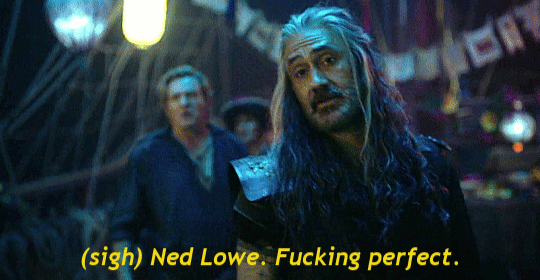
Cut to Ed and Stede tied up while Ned attempts to set the mood so he can monologue about why he wants to kill Ed.

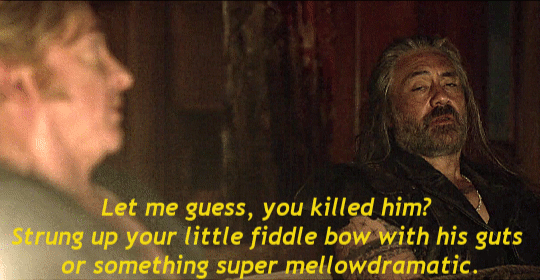

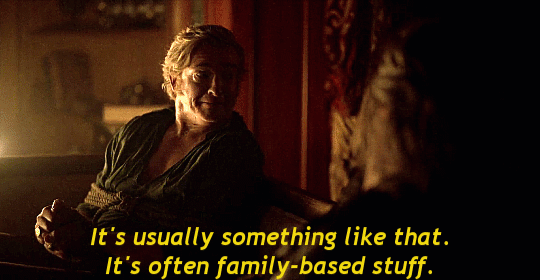
Ed knows what’s coming. He is going to suffer but he still can’t be arsed to meet Ned with anything but vaguely bored dismissiveness (and Stede is happy to play along).
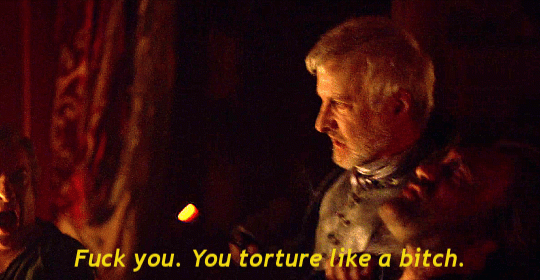
Up on the deck, Ned prepares the crew for his big, dramatic moment of symphonic torture.
Note that the Revenge crew is tied down, braced by vices and generally unable to protect themselves from imminent torture and possible death, but their spirits are up. They don’t seem terribly fussed.
Then Stede uses his people positive management style to happily orchestrate a worker uprising in Ned’s crew.
Ned’s crew responds instantly; severing their allegiance to Lowe and telling him off.
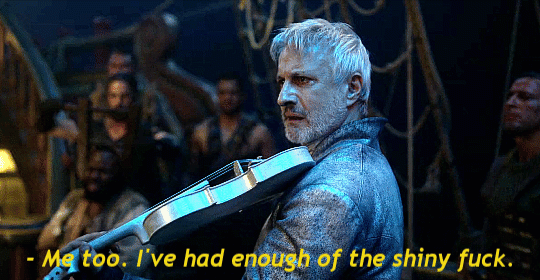
The crew sails away and talks profit sharing while Ned dully threatens to hunt them down.
Ned is now a prisoner of the Revenge crew and seems entirely disinterested in his own survival.


And Ned sinks to the depths, without struggling at all.
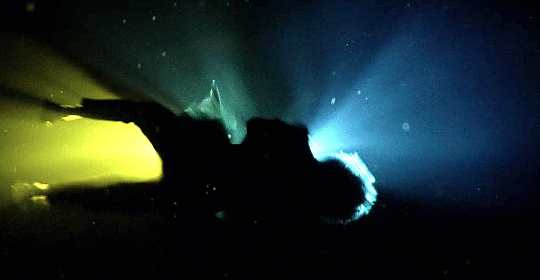
There is a lot going on in this episode: pay and labor equity direct action, gay love engagement bliss, kink humor, Stede being a hero and saving his crew by playing to his strengths, then having to decide whether to kill in cold blood and feel the consequences of that choice. Ed having one more reason to be done with piracy (while being so impressed with and fond of Stede), and then watching his man make a fraught choice and having to deal with the fallout from that. (And, damn, I haven’t even mentioned the passionate sex bit.) Anyway, back to the point.
Now for the the meta part
The Ned Lowe sequences are perfectly in keeping with OFMD’s signature blend of madcap violence, humor, and big emotional gut punches. But something about Ned Lowe just strikes me as off for this show.
Ned is seriously threatening the crews’ lives, so why don’t they take him seriously?
Why does Ned have such a boring, throwaway backstory?
Why is Ned so nonchalant about his own death; like it’s a foregone conclusion?
Why does Ned have a silver violin and silver spurs on his slip-on dress shoes?
Why is Ned sartorially monochromatic?
And then I realized who Ned reminds me of.
This guy,
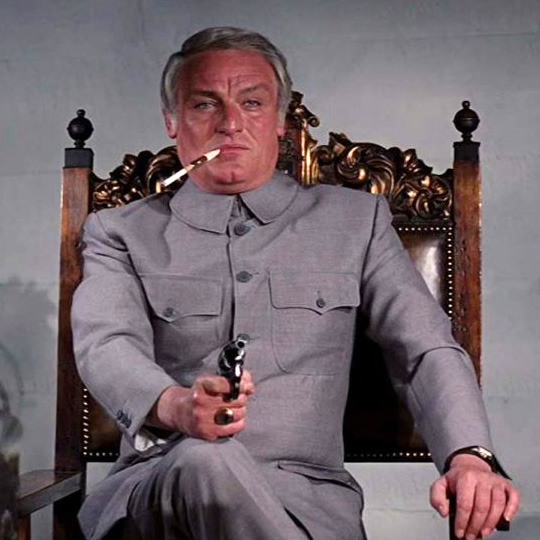
Earnst Stavro Blofeld in the James Bond film Diamonds are Forever (1971)
And this guy,
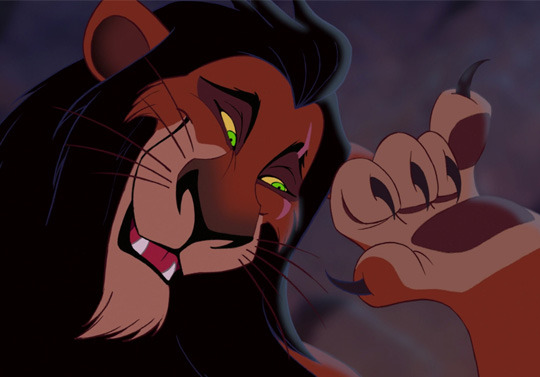
Scar in Disney's The Lion King (1994).
And this guy,
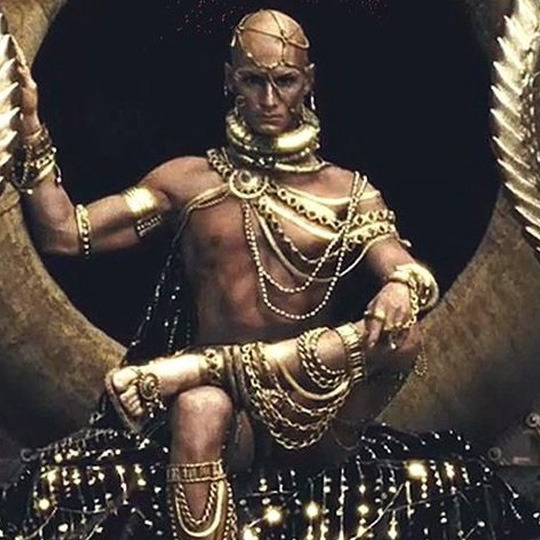
Xerxes, 300 (2006).
And it sure seems like Ned Lowe isn’t just an episodic villain. He is an archetype of the one-dimensional, stereotypical queer-coded villain that has been endemic in film and television throughout history. The OFMD writers have a lot to say about what to do with this kind of character:
Don’t respect him.
Feel free to openly mock him.
Don’t let him take your joy, even though he will hurt you.
He won’t disappear on his own. You have to throw something at him (take action) to make him go away.
Once he’s in the water, he’s content to drown. He’s not into what he’s doing any more than you are.
Oh and, just to be clear,

The LGBTQIA+ community has a very long history of turning shit media into better stories. So, hey, big media, prepare to have your crap characters wrecked (improved).
Now, back to our transformative pirate show with rich, complex queer characters and a multi-layered plot that surprises me every week and makes me feel big feelings - most of all, joy.
Final thought: I do wonder if Ned Lowe is monochromatically silver as a tribute to/poke at, Hollywood and the silver screen.
This meta was written before OFMD season 2 has fully aired. No idea what’s going to happen in the finale (and I’ve generally fled social media to avoid spoilers). I’ll be back, looking at everyone’s fascinating posts after episode 8 airs.
#JFC the OFMD writers have game#OFMD writers do not like stereotypes and know what to do about it#One-dimensional stereotypical queer-coded villains#OFMD meta#Ned Lowe#Thank you David Jenkins#Thank you Alyssa Lane#Thank you Alex Sherman#Thank you Eliza Jimenez Cossio#Thank you Zarye Ferrer#Thank you William Meney#Thank you John Mahone#Thank you Jess Tom#Thank You Natalie Torres#Thank you Simone Nathan#Thank you Adam Stein#Thank you Yvonne Zima#Thank you pocket friends for being awesome and keeping me curious and inspired#Our flag means death#OFMD S2 E6#Calypso’s Birthday#OFMD S2 spoilers#OFMD S2 E6 spoilers
726 notes
·
View notes
Text
Thank Your Jewish Friends Trying to Educate You Right Now
If you’re a leftist, and you have had a Jewish friend reach out to you to try and tell you that you’ve said something alarming or harmful or antisemitic: listen to them, learn, and say thank you.
I am VERY lucky in that all the friends I’ve personally reached out to have taken the opportunity to learn and grow and adjust their behavior. I have never told them that they should not advocate for Palestine. I have told them I want to advocate for Palestine WITH them, but I need to feel safe in order to do so. I need to feel like the people I’m advocating with don’t want me and my loved ones dead. Thank HaShem that they have listened to me. From the bottom of my heart, my friends are a blessing.
But I’ve seen an incredibly disheartening number of fellow Jews who have had the opposite experiences—being expelled from their queer communities and activist communities and book clubs and any space they once found community. This is horrid but it’s especially horrid for Jews. It’s a reminder that we are only accepted if we conform. We are only accepted if we accept abuse. Our presence is always tolerated, never wanted. Our views are not to be trusted. Our opinions are always suspect. Our motives are always sinister. Our acceptance is always conditional. And I think that hurts even more for us than you’d imagine, because our own spaces are no longer safe. We are already in diaspora. And now our synagogues and homes and other community buildings are being vandalized and attack. We are cut off from our own cultural community and now many of us are being cut off from our personal communities as well. It is a loneliness that most people outside of a diaspora will never know.
Im willing to bet that if you have/had a Jewish friend who you considered close but who seems to have disappeared from your life, it’s because you either didn’t reach out to them after 10/7 or you have failed to acknowledge the stochastic threat to Jews or the Jewish connection to Israel. Why is it important that you do this? Because we are your friends and loved ones. And when friends and loved ones tell you they are hurting, you should listen. When you say you care about someone, you should be willing to listen to them when they say you’re hurting them and then you should apologize. It is more hurtful than you can possibly imagine to watch people you thought cared about you decide to listen to people across the world who they have never met rather than simply have a conversation with a friend, because they assume that friend will dismiss the pain of Palestinians.
Many of you are assuming what your friends are feeling about Israel and Palestine, but you haven’t actually asked them. Many of you think that expressing sorrow for Israel or jews in the world, that means we cannot care about or want a better future for Palestine.
If you are lucky enough to have a friend who has tried to reach out to you, that means they are willing to forgive you for neglecting them in this time. They are willing to talk with you and try to explain their emotions in good faith. They want to find a way to advocate for progress with you. They want to keep you in their lives. They want you to understand our culture and history—not at the exclusion of anyone else’s culture and history—just at the inclusion of our own.
Because here’s the other thing: they won’t forget that you denied them understanding and respect and the benefit of the doubt. That’s not a threat. That’s a cultural feature of Judaism. We have famously long cultural memories. We remember the people and places we can trust and those who refused to give us peace and safety and basic kindness. We remember the people who targeted us, your friends and loved ones, simply because other Jews who we have never met behaved in ways you don’t understand and of which you don’t approve. You are blaming the sins of others on people you claim to love.
If someone is giving you the chance to undo the damage you have done on this, you should take it. And if you have expelled Jews from a space you once shared or failed to acknowledge their pain in this time—find them and apologize.
I am not Muslim, but I wouldn’t doubt that something similar is happening in Muslim spaces. Islamophobia and antisemitism are at terrifyingly high levels right now. And if you think you can’t support Jews without condemning Muslims or you can’t support Muslims without condemning Jews, you’re not only part of the problem—you’re the biggest part of the problem.
What we all need right now is unity, peace, solidarity, understanding, and education above all else.
533 notes
·
View notes